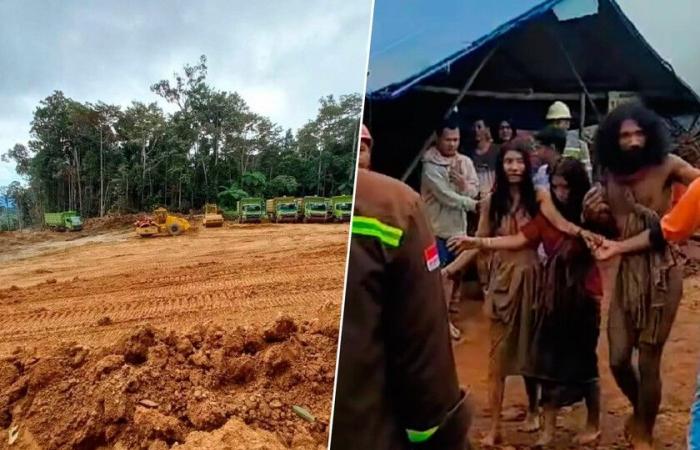
Footage shows an isolated tribe in Indonesia asking for help from miners who ravage their land to get nickel for electric cars
Last year the images went viral. Then, the green light was given for logging and mining operations in Indonesia, penetrating the rainforest of the isolated Hongana Manyawa village. What was shocking was not so much the arrival of the machines, it was the apparent struggle of two indigenous people with the excavator, waving their weapons to express that their presence was not welcome. The latest images shed more controversy on the situation in the area. In the background: the search for nickel.
The tribe asks for help. The clip shows several Hongana Manyawa approaching miners who are deforesting their land. In this case, not to stop them, but to ask them for help. According to Survival International, the NGO that shared the video, they were asking for food. “We don’t know if they will survive after the encounter or for how long. They could have contracted any number of diseases that would prove fatal. Or they may die of hunger; The reason why they left their territory is because their increasingly reduced territory cannot feed them,” says the NGO.
In fact, Survival claims to have contacted a person from the Hongana Manyawa who told it that their people are starving as a result of the clearing of their ancestral rainforest for mining.
The Hongana Manyawa. Until recently, they were one of the few isolated tribes. They live on the island of Halmahera and are one of the last nomadic hunter-gatherer tribes in Indonesia. It is estimated that there are between 300 and 500 members isolated by their own will, as well as 3,000 Hongana Manyawa who were contacted in the 1980s and maintain some contact with the rest of the world.
The problem: nickel. The arrival of the machines and different mining companies to the area is no surprise. The enclave sits on one of the largest nickel reserves in the world, and in recent years, demand for the mineral has skyrocketed due to its use in electric car batteries, attracting the attention of international mining corporations. on the island.
Weda Bay Nickel. It is one of the key companies in the area. A company partially owned by the French mining company Eramet that began mining operations on the island in 2019 and has important plans to intensify its efforts in the coming decades. According to Survival, the German chemical company BASF is looking to partner with them in Halmahera to carry out a large smelting project from the area. Essentially converting nickel to a grade that can be used for electric car batteries.
For its part, Weda Bay Nickel has argued that its mining concessions are not close to the lands inhabited by isolated peoples. However, Survival says they have leaked internal documents showing the company hired anthropologists who warned about the presence of isolated Hongana Manyawa people in and around the area.
Tesla. The company has invested $5 billion with the Indonesian government so far, while partnering with several companies connected to the Weda Bay mining company on the island. Musk’s company’s agreement is to buy nickel and cobalt, although when asked about the situation, the answer is directed to the internal code of ethics, which establishes guarantees that are not always met for the extraction and processing of the raw materials for its products, after all, nickel is essential for the production of batteries.
Be that as it may, Tesla has expressed that they “expect” their mining industry suppliers to “engage with the legitimate representatives of indigenous communities and include the right of free and informed consent in their operations.” Even so, the American company is also related to business with other less “dialogue” companies on the island, such as the Chinese Huayou Cobalt or CNGR Advanced Material.
The key, a concession. If you are wondering how it all started, we must go back to 1998, when a concession of approximately 45,000 hectares was granted to Weda Bay Nickel by the then military dictator of Indonesia, Suharto. For several years and due to the decline of the nickel market, the project was stalled, but was intensively resumed after the Chinese conglomerate Tsingshan Holding Group joined with a majority stake through a subsidiary in 2017.
The paradox of “sustainable” cars. Although it is considered that the consumption of electric cars is better for the planet than motor cars, it still has externalities, hence paradoxes occur such as its supply chain leading to a shortage of materials and ending up associated in some way with destruction of jungles and indigenous peoples.
For Survival, “it is also not respectful of the climate to raze the forest of the Hingana Manyawas, or the destruction of vast jungle areas in the interior of Halmahera by companies that seek to project an ecological image and that claim to defend a sustainable lifestyle for people who live thousands of kilometers away,” they say.
Image | Survival
In Xataka | Indonesia already knows the consequences of leading nickel production: it has doubled its coal consumption
In Xataka | Nickel plays a vital role in electric car batteries. China dominates its production with an iron fist





